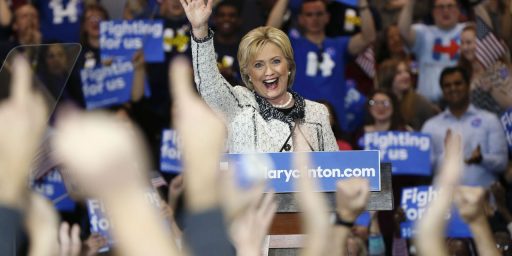Privatization of Campaign Financing
The New York Times is running a breathless story by David Kirkpatrick under the headline “Death Knell May Be Near for Public Election Funds.” The lede:
The public financing system for presidential campaigns, a post-Watergate initiative hailed for decades as the best way to rid politics of the corrupting influence of money, may have quietly died over the weekend.
Senator Hillary Rodham Clinton of New York became the first candidate since the program began in 1976 to forgo public financing for both the primary and the general election because of the spending limits that come with the federal money. By declaring her confidence that she could raise far more than the roughly $150 million the system would provide for the 2008 presidential primaries and general election, Mrs. Clinton makes it difficult for other serious candidates to participate in the system without putting themselves at a significant disadvantage.
Officials of the Federal Election Commission and advisers to several campaigns say they expect the two candidates who reach Election Day 2008 will raise more than $500 million apiece. Including money raised by other primary candidates, the total spent on the presidential election could easily exceed $1 billion.
Who is it that has hailed the system, exactly? Not the American people, who overwhelmingly refused to check the box on their taxes allocating $1 to the fund despite being assured it would not impact their tax bill. Raising the amount to $3 didn’t help, either.
Why should our presidential candidates be on the public dole? Why should Republicans have to fund Hillary Clinton’s campaign or Democrats Mitt Romney’s?
And, really, why is $1 billion spent over two years an outrageous amount to choose the person who will occupy the most powerful office on the planet for four years? USA Today reports that there will be “about 60 ad slots for sale” for this year’s Super Bowl, with ads selling for “more than $2.6 million” apiece. Last year, the ads “averaged about $2.5 million per slot.” That’s about $150 million during a four hour football game. There are four Super Bowls during a presidential term, so that’s $600 million.
Looked at another way, there are a little over 300 million people in this country as counted by the Census Bureau. A billion dollars amounts to $3.33 for each of them. That’s less than the cost of most magazines or a cheap combo meal at a fast food restaurant. Surely, electing the leader of the free world is worth at least that much?






If I had my druthers, James, I’d make it illegal for television stations to accept money for political advertising. Not ban it. Illegal to sell it: clearly within Congress’s powers under present interpretations of the commerce clause.
I believe it’s the cost of television advertising that’s driving political spending up.
The other problem is the value measured in power and money of political office. But that’s a lot harder to deal with.
I hope OTB readers will be jumping up to praise HRC for saving the public millions of dollars.
My guess is that most people don’t really understand what the $3 is for.
We should not conclude that people don’t support the idea of public funding from their refusal to check the box.
Why should Republicans have to fund Hillary Clinton’s campaign or Democrats Mitt Romney’s?
Simple. Because democracy is something that unites us, not divides us. We are all in this together, and only if campaigns are publicly funded–ideally totally so, not just with the broken system of public matching funds–can we ever have parties and candidates that we know are working for US and not for the richest few.
I am enough of a realist to recognize that total public financing may not be practical, or even desirable. But it is the ideal against which campaign-finance systems should be measured. And ours has come up short for a long time, and it is sinking lower into the muck all the time.
Why should we be financing Sharpton and Kucinisc’s campaigns..frankly it looks to me like a swell way for certain to lose candidates to get a lot of free trips and publicity.
Anyway I’m looking forward again to those 40 person Dem primary “debates” where we learn little more about the candidates than their names.
More money is spent every year in America on porn, or snack foods, for that matter, than is spent in these “expensive” election campaigns